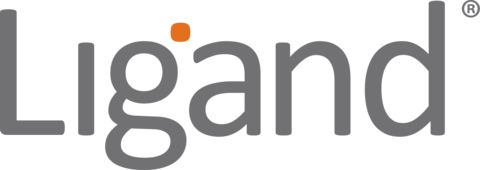Ligand’s Partner Merck Receives FDA Approval for VAXNEUVANCE™ for the Prevention of Invasive Pneumococcal Disease in Adults Caused by 15 Serotypes
Ligand’s Partner Merck Receives FDA Approval for VAXNEUVANCE™ for the Prevention of Invasive Pneumococcal Disease in Adults Caused by 15 Serotypes
VAXNEUVANCE, formerly V114, utilizes Ligand’s CRM197 carrier protein (PeliCRM™)
SAN DIEGO--(BUSINESS WIRE)--Ligand Pharmaceuticals Incorporated (NASDAQ: LGND) announced that its partner Merck has received approval from the U.S. Food and Drug Administration (FDA) for VAXNEUVANCETM, also known as V114, for the prevention of invasive disease caused by Streptococcus pneumoniae serotypes 1, 3, 4, 5, 6A, 6B, 7F, 9V, 14, 18C, 19A, 19F, 22F, 23F and 33F in adults 18 years of age and older. VAXNEUVANCE is a 15-valent pneumococcal vaccine utilizing Ligand’s CRM197 vaccine carrier protein, which is produced using the patent-protected Pelican Expression Technology™ platform.
Under the terms of the licensing agreement with Merck, Ligand earned a $2 million milestone payment upon FDA approval of VAXNEUVANCE and is entitled to a low-single-digit royalty on net product sales.
Merck plans to submit a supplemental regulatory licensure application with the FDA later this year for the use of VAXNEUVANCE in children.
“We are delighted to see Merck’s progress with VAXNEUVANCE along with the FDA approval of another Pelican Expression Technology-enabled medical advancement,” said John Higgins, CEO of Ligand. “We look forward to the launch of this important pneumococcal conjugate vaccine, and the continued development and progression of our multiple partnerships involving Pelican’s cost-effective and scalable production of our CRM197 vaccine carrier protein also known as PeliCRM™.”
About the Pelican Expression Technology™
The Pelican Expression Technology™ is a robust, validated, cost-effective and scalable platform for recombinant protein production that is especially well-suited for complex, large-scale production of protein-based therapeutics. Multiple global manufacturers have demonstrated consistent success with the platform and the technology is currently licensed for numerous commercial and development-stage programs. The versatility of the platform is demonstrated by the production of antibody derivatives, peptides, enzymes, and engineered non-natural proteins. Partners seek the platform because it brings significant value to the development of therapeutics and vaccines by reducing timelines and manufacturing costs. Given pharmaceutical industry trends toward large molecules with increasing structural complexities, Pelican is positioned to meet these growing needs as the industry’s most comprehensive broadly available protein production platform. CRM197 made in Ligand’s Pelican Expression Technology is available to scientists and manufacturing professionals in research and cGMP grade. Lean more about Ligand’s CRM197 (PeliCRM™) at www.crm197.com. For more information about the Pelican Expression Technology platform, please visit www.pelicanexpression.com.
About Ligand Pharmaceuticals
Ligand is a revenue-generating biopharmaceutical company focused on developing or acquiring technologies that help pharmaceutical companies discover and develop medicines. Ligand’s business model creates value for stockholders by providing a diversified portfolio of biotech and pharmaceutical product revenue streams that are supported by an efficient and low corporate cost structure. Ligand’s goal is to offer investors an opportunity to participate in the promise of the biotech industry in a profitable, diversified and lower-risk business than a typical biotech company. Ligand’s business model is based on doing what Ligand does best: drug discovery, early-stage drug development, product reformulation and partnering. Ligand partners with other pharmaceutical companies to leverage what they do best (late-stage development, regulatory affairs and commercialization) to ultimately generate our revenue. Ligand’s OmniAb® technology platform is a patent-protected technology stack used in the discovery of fully human mono- and bispecific therapeutic antibodies. The Captisol® platform technology is a patent-protected, chemically modified cyclodextrin with a structure designed to optimize the solubility and stability of drugs. Ligand’s Pelican Expression Technology™ is a robust, validated, cost-effective and scalable approach to recombinant protein production, and is especially well-suited for complex, large-scale protein production that cannot be made by traditional systems. Ligand has established multiple alliances, licenses and other business relationships with the world’s leading pharmaceutical companies including Amgen, Merck, Pfizer, Roche, Jazz Pharmaceuticals, Sanofi, Janssen, Takeda, Gilead Sciences, GSK and Baxter International. For more information, please visit www.ligand.com.
Follow Ligand on Twitter @Ligand_LGND.
Forward-Looking Statements
This news release contains forward-looking statements by Ligand that involve risks and uncertainties and reflect Ligand's judgment as of the date of this release. Words such as “plans,” “believes,” “expects,” “anticipates,” and “will,” and similar expressions, are intended to identify forward-looking statements. These forward-looking statements include: the timing and amount of milestone payments Ligand expects; the potential to receive royalties from net sales of VAXNEUVANCE; the submission of any VAXNEUVANCE supplemental regulatory licensure application with the FDA; and the intellectual property protections with respect to Ligand’s technologies, including its OmniAb® and Captisol® platforms and Pelican Expression Technology™. Actual events or results may differ from Ligand’s expectations due to risks and uncertainties inherent in Ligand’s business, including, without limitation: regulatory agencies may not agree with Merck’s interpretation of results from its clinical trials; regulatory agencies may request additional data in connection with its review of any supplemental regulatory licensure applications; Ligand is dependent on Merck on the development and commercialization of VAXNEUVANCE; Merck may not generate net sales to generate royalties payable to Ligand; and other risks described in Ligand’s prior press releases and filings with the Securities and Exchange Commission available at www.sec.gov. Ligand disclaims any intent or obligation to update these forward-looking statements beyond the date of this release. This caution is made under the safe harbor provisions of the Private Securities Litigation Reform Act of 1995.
Contacts
Ligand Pharmaceuticals Incorporated
Simon Latimer
investors@ligand.com
(858) 550-7766
Twitter: @Ligand_LGND
LHA Investor Relations
Bruce Voss
bvoss@lhai.com
(310) 691-7100
